Caryn’s Thoughts

 My grandniece, Maya Stevens is such a happy baby girl. She loves playing with her big sister, Elliott Stevens, who very much loves to entertain her little sister. Maya love learning new things. She was just playing with a walker toy and didn’t even realize that she really was walking and walking well. She also stands alone for 10 to 20 seconds before she realizes what she is doing. That’s how it goes with children. If the learning is made to be like play, they learn quickly. It’s the nature of babies and children. Maya loves her parents, Kayla and Garrett Stevens, so much. They are her favorite people. She also loves her grandparents, Alena and Mike Stevens and Lynette and Wes Smiley, very much. She also loves her cousins, especially Brooklyn Killinger, whom she
My grandniece, Maya Stevens is such a happy baby girl. She loves playing with her big sister, Elliott Stevens, who very much loves to entertain her little sister. Maya love learning new things. She was just playing with a walker toy and didn’t even realize that she really was walking and walking well. She also stands alone for 10 to 20 seconds before she realizes what she is doing. That’s how it goes with children. If the learning is made to be like play, they learn quickly. It’s the nature of babies and children. Maya loves her parents, Kayla and Garrett Stevens, so much. They are her favorite people. She also loves her grandparents, Alena and Mike Stevens and Lynette and Wes Smiley, very much. She also loves her cousins, especially Brooklyn Killinger, whom she 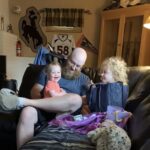 will totally hang out with for hours. Of course, she loves Brooklyn’s brother, Jaxxon Killinger too. He makes her laugh.
will totally hang out with for hours. Of course, she loves Brooklyn’s brother, Jaxxon Killinger too. He makes her laugh.
Maya is learning so many new things. She loves kids, but Brooklyn and Elliott are her favorites. She is in that “I don’t like strange adults” stage right now…especially men, and she is very aware of where her mom and Dad are at all times. If they leave the room, Maya knows it. That is rather a common thing among one-year-old children. They just don’t feel comfortable with people they don’t know well. I think its a good thing actually. Maya is crawling around all over the place and getting into stuff. That could be bad, but the house is already kid-proof, so it’s ok. When Maya gets into the pans, it’s time for the “one girl band” to play. She bangs the pans 
 and makes as much noise as she can. She likes banging on pans or anything that makes a loud noise…to the delight of her parents…I’m sure. She loves to play in the water, especially when her daddy makes sure she gets wet.
and makes as much noise as she can. She likes banging on pans or anything that makes a loud noise…to the delight of her parents…I’m sure. She loves to play in the water, especially when her daddy makes sure she gets wet.
Maya doesn’t have any teeth yet, but her mom is sure they will be popping through any day now. Kayla often sends out videos to friends and family so we can see the antics of Elliott and Maya!! We all love to see them very much. The girls are just precious, and they bring joy to anyone who knows them…especially their parents. Maya goes to daycare these days, and the daycare ladies absolutely love her. They are always telling her parents just how sweet she is. Today is Maya’s first birthday. Happy birthday Sweet Maya!! Have a great day!! We love you!!
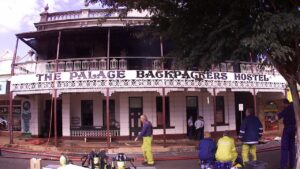
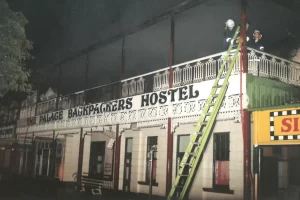 Hiking and Backpacking have been a favorite pastime for many people for many years, and some people go to greater lengths and distances than others. Backpacking in Australia is a trip on the bucket lists of a lot of people. On their hikes, many people have made the Childers Palace Backpackers Hostel one of their stops. Located in the former Palace Hotel in the town of Childers, Queensland, Australia, the building had been converted into a backpacker hostel. That was the stop for 15 backpackers on June 22, 2000. They had been hiking all day and were ready for some downtime. After a relaxed evening, they all went to bed. There were 88 people staying in the building that night, but the building could house 101 people.
Hiking and Backpacking have been a favorite pastime for many people for many years, and some people go to greater lengths and distances than others. Backpacking in Australia is a trip on the bucket lists of a lot of people. On their hikes, many people have made the Childers Palace Backpackers Hostel one of their stops. Located in the former Palace Hotel in the town of Childers, Queensland, Australia, the building had been converted into a backpacker hostel. That was the stop for 15 backpackers on June 22, 2000. They had been hiking all day and were ready for some downtime. After a relaxed evening, they all went to bed. There were 88 people staying in the building that night, but the building could house 101 people.
At about 12:30am on June 23, 2000, a fire started in the downstairs recreation room and quickly spread up the walls and into the stairwell. The first emergency call came from a pay phone across the street, and it was logged at 12:31am. Emergency services first arrived at 12:38am and spent four hours battling the fire before it was fully extinguished. In the aftermath, it was found that 15 backpackers, nine women and six men, had lost their lives. Survivors told of how smoke quickly filled the area and how the building’s power was lost. They struggled in the darkness to find a way out, and in the absence of alarms and emergency lighting, some people attempted to awaken and rescue as many people as they could. Of the 70 backpackers who survived the fire, 10 suffered minor burns and injuries as they tried to escape from the upper level and by jumping onto the roofs of the neighboring buildings. In this fire, those who got out lived, those who died did not get out at all.
Of the 15 who died in the fire, seven were British, three were Australian, two were from the Netherlands, and one each from Ireland, Japan, and South Korea. It took a while to identify the dead, because there was an incomplete hostel register. It recorded check-ins, but unfortunately not departures. To further complicate things, most of the residents’ passports were destroyed or damaged by the fire. DNA samples were also difficult to obtain for those with no relatives in Australia. Most of the backpackers who died were on the first floor of the hostel. Through an inquest, it was found that in one of the upper rooms where 10 victims were found, which was all of the occupants of that room, a bunk bed blocked a fastened exit door, and the windows were barred. They had little chance of escape.
It was found that a fruit packer named Robert Paul Long, had moved into the hostel on March 24, 2000, but had been evicted on June 14, 2000, over a matter of $200 rent in arrears. Long didn’t leave the area, as was seen in ATM records that showed him in the area in the week before the fire. Long, who had expressed a hatred of backpackers, had also earlier threatened to burn down the hostel. Around midnight, prior to the fire, two guests saw Long in the back yard of the hostel. Long had asked them to leave the door open so he could assault his former roommate, an Indian national. They declined, and he told them that he still had a key. Another guest recounted how he had woken up around midnight to find Long downstairs using a PC near a burning rubbish bin. After the guest protested the reckless actions, Long took the bin outside, and the guest went back to bed, but was awakened later to banging sounds, shouting, and thick black smoke.
After the fire, Long tried to mask his movements, but he was later spotted in cane-fields about five days later. At that time, he was arrested in bush-land near Howard, which is less than 20 miles from Childers. As he was being arrested, Long stabbed a police dog after being bitten. Then, he stabbed one of the officers in the jaw and the second officer shot Long in the shoulder. In March of 2002, Long was found guilty of two charges of murder (for the dead Australian twins) and arson and sentenced to life in prison. While it seems strange to only charge him with the deaths of two of the 15 victims, it was thought that it would expedite the proceedings and to allow for other charges to be brought in the event of an acquittal. Following his conviction, Long filed an appeal in 2002, which was denied. In June 2020 he became eligible for parole, but his February 2021 parole appeal was rejected. He could become eligible again in 1 year.
After the fire, and many people losing everything they owned, survivors were temporarily housed locally at the Isis Cultural Centre. Japan’s embassy officials quickly evacuated five Japanese nationals, which eased things a little. Residents of Childers knitted blankets and donated food and backpacks for the survivors. Residents also invited survivors for meals and showers and local businesses assisted with food, clothing, and personal items. Media, politicians, and investigators came to the site as well and Princess Anne visited on July 2nd, to meet the surviving backpackers and others involved in the disaster.
The results of a coronial inquest were released in 2006. “The hostel, a 98-year-old, two-story timber building, did not have working smoke detectors or fire alarms. It was later reported that the owner had installed fire alarms in the building, but they had been disabled weeks prior to the fire due to regular malfunctioning. It was also mentioned that batteries for the stand-alone alarms were sometimes removed by customers for portable cameras or music players.” When it was announced that the coroner had decided not to charge the owner and operators of the hostel for negligence, families of seven victims filed a class action suit against them.
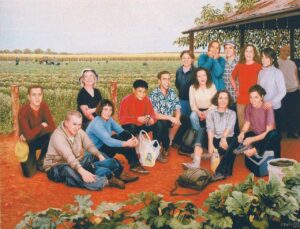
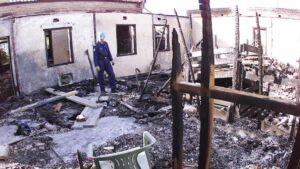 On October 26, 2002, the renovated structure, renamed the Palace Memorial Building, opened and the opening ceremony was attended by some 250 invited guests, including members of 12 of the families of those who died. Frank Slarke, the father of the dead Australian twins, read a poem he wrote as a eulogy. Since then, over one million visitors have visited the building.
On October 26, 2002, the renovated structure, renamed the Palace Memorial Building, opened and the opening ceremony was attended by some 250 invited guests, including members of 12 of the families of those who died. Frank Slarke, the father of the dead Australian twins, read a poem he wrote as a eulogy. Since then, over one million visitors have visited the building.
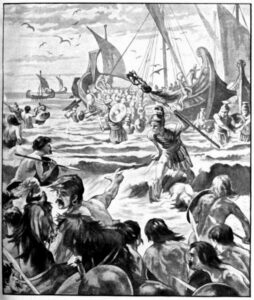
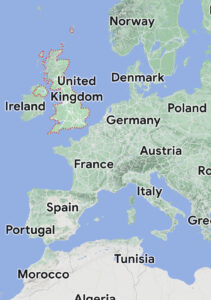 Before Julius Caesar invaded Britain, many Romans didn’t believe it existed. Julius Caesar was the first-ever Roman to invade Britain. He did it twice in the years 55 and 54 BC. Some Romans believed Britain to be just the foot of another huge northern continent. Others thought it was a place full of unbelievable riches, whilst most thought it just didn’t exist.
Before Julius Caesar invaded Britain, many Romans didn’t believe it existed. Julius Caesar was the first-ever Roman to invade Britain. He did it twice in the years 55 and 54 BC. Some Romans believed Britain to be just the foot of another huge northern continent. Others thought it was a place full of unbelievable riches, whilst most thought it just didn’t exist.
In the course of his Gallic Wars, Julius Caesar invaded Britain twice: in 55 and 54 BC. On the first occasion Caesar took with him only two legions and achieved little beyond a landing on the coast of Kent. The second invasion consisted of 628 ships, five legions and 2,000 cavalry. The Roman legion is the largest military unit of the Roman army,  comprised 5,200 infantry and 300 equites (cavalry) in the period of the Roman Republic (509 BC–27 BC) and 5,600 infantry and 200 auxilia in the period of the Roman Empire (27 BC – AD 476). Caesar’s force was so overwhelming that the Britons did not dare contest Caesar’s landing in Kent, waiting instead until he began to move inland. Caesar’s forces eventually made their way into Middlesex and crossed the Thames, forcing the British warlord Cassivellaunus to surrender, after which Caesar set up Mandubracius of the Trinovantes as client king, basically a sub king. As with all conquerors, Caesar included the accounts of both invasions in his Commentarii de Bello Gallico, with the first significant first-hand description of the people, culture, and geography of the island.
comprised 5,200 infantry and 300 equites (cavalry) in the period of the Roman Republic (509 BC–27 BC) and 5,600 infantry and 200 auxilia in the period of the Roman Empire (27 BC – AD 476). Caesar’s force was so overwhelming that the Britons did not dare contest Caesar’s landing in Kent, waiting instead until he began to move inland. Caesar’s forces eventually made their way into Middlesex and crossed the Thames, forcing the British warlord Cassivellaunus to surrender, after which Caesar set up Mandubracius of the Trinovantes as client king, basically a sub king. As with all conquerors, Caesar included the accounts of both invasions in his Commentarii de Bello Gallico, with the first significant first-hand description of the people, culture, and geography of the island. 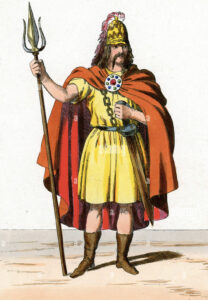
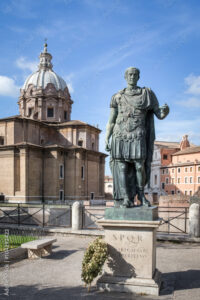 Caesar’s writings are thought to be the start of the written history or at least the protohistory of Britain.
Caesar’s writings are thought to be the start of the written history or at least the protohistory of Britain.
It seems odd to me to think that people could simply not think that Britain exists, but I suppose that in a huge part of our world’s history, and actually still with some people today, it was thought that the Earth is flat, meaning that the horizon we see is all there is. If that is your mindset, it would be easy to limit the Earth to the horizon we can see, but it would not be an assumption that would be based on fact. Now with satellites and airplanes we know that the Earth is definitely round, just like the Bible and most people have said. And that said, we know that Britain existed long before the men of Caesar’s time found and invaded.

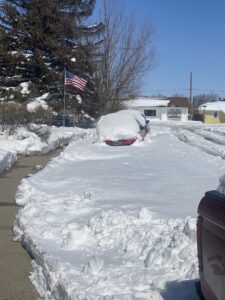 Normally, on this first day of Summer, I would be thinking about the days coming up, the precious few days when I finally get to feel the warmth that doesn’t come from being wrapped in a blanket or wearing a coat. Yes, Summer can be sweltering, and I can find myself wishing for a little cooler temperature, but I don’t want it to be much cooler. I am a summer person. I like heat. I like wearing shorts and sandals, rather than sweaters and coats.
Normally, on this first day of Summer, I would be thinking about the days coming up, the precious few days when I finally get to feel the warmth that doesn’t come from being wrapped in a blanket or wearing a coat. Yes, Summer can be sweltering, and I can find myself wishing for a little cooler temperature, but I don’t want it to be much cooler. I am a summer person. I like heat. I like wearing shorts and sandals, rather than sweaters and coats.
This year is a rather odd year…not that we haven’t had years of unusual weather…and no, I don’t buy into the whole global warming, climate change, or whatever they are calling it these days. Weather had natural patterns that have existed since time began, and this is nothing new. Nevertheless, when we have one of those years of an unusually cold Spring, and unusually harsh Winter, and somehow a fairly normal Fall, I find myself waiting for normalcy, impatiently!!
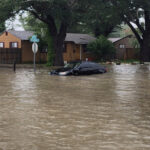
 This has been one of those years, and I’m ready for the end of Spring. Our Winter was harsh, with lots of snow and this Spring has been full of thunderstorms and pouring rain…to the point of flash flooding and lots of warnings for lightning, hail, tornadoes, and floods. Those things aren’t all that unusual, with the possible exception of the floods, but the thing I really noticed was the cold temperatures. Normally as we approach the end of June, I am wearing shorts and t-shirts when I go out for my early morning walk. This year, however, I have been wearing pants and a jacket to keep me warm. Of course, by the time I am almost finished, I’m warm enough to go without a jacket…except for the clouds. Clouds just keep things cooler.
This has been one of those years, and I’m ready for the end of Spring. Our Winter was harsh, with lots of snow and this Spring has been full of thunderstorms and pouring rain…to the point of flash flooding and lots of warnings for lightning, hail, tornadoes, and floods. Those things aren’t all that unusual, with the possible exception of the floods, but the thing I really noticed was the cold temperatures. Normally as we approach the end of June, I am wearing shorts and t-shirts when I go out for my early morning walk. This year, however, I have been wearing pants and a jacket to keep me warm. Of course, by the time I am almost finished, I’m warm enough to go without a jacket…except for the clouds. Clouds just keep things cooler.

 As I was walking these past few mornings, I thought about just how much cooler it had been this Spring, and I hoped that as the Summer arrived, it would finally begin to warm up. I also thought about another Summer about 20 years ago or so. The Spring had been cold that year too, and Summer hadn’t improved much. In fact, it was the coldest Summer I had ever remembered. Infact, it was as if Summer never arrived that year. That makes for the feeling of a long cold Winter, even though there were some warm days. The good thing about the colder rainy weather, however, was that the grass, and several other things grew better that they had in years. I guess that’s a plus, but if you don’t mind, I’ll take the warmer weather, with the leaves on the trees and the deer by the trail. Those things make my whole day.
As I was walking these past few mornings, I thought about just how much cooler it had been this Spring, and I hoped that as the Summer arrived, it would finally begin to warm up. I also thought about another Summer about 20 years ago or so. The Spring had been cold that year too, and Summer hadn’t improved much. In fact, it was the coldest Summer I had ever remembered. Infact, it was as if Summer never arrived that year. That makes for the feeling of a long cold Winter, even though there were some warm days. The good thing about the colder rainy weather, however, was that the grass, and several other things grew better that they had in years. I guess that’s a plus, but if you don’t mind, I’ll take the warmer weather, with the leaves on the trees and the deer by the trail. Those things make my whole day.
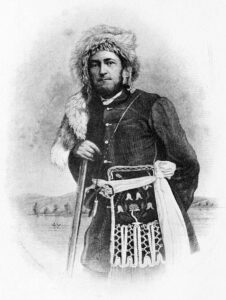 Joe Meek was born in Virginia in 1810. He was a friendly young man, with a great sense of humor, but he had too much rambunctious energy to do well in school. He just couldn’t sit still well enough to focus on his studies. Finally, at 16 years old and illiterate, Meek gave up on school and moved west to join two of his brothers in Missouri. Still, he didn’t give up on all of his learning, just the formal learning. In later years, he taught himself to read and write, but his spelling and grammar remained “highly original” throughout his life.
Joe Meek was born in Virginia in 1810. He was a friendly young man, with a great sense of humor, but he had too much rambunctious energy to do well in school. He just couldn’t sit still well enough to focus on his studies. Finally, at 16 years old and illiterate, Meek gave up on school and moved west to join two of his brothers in Missouri. Still, he didn’t give up on all of his learning, just the formal learning. In later years, he taught himself to read and write, but his spelling and grammar remained “highly original” throughout his life.
Meek seemed to flourish in the West. It appears that he had found his calling, and in early 1829, he joined William Sublette’s ambitious expedition to begin fur trading in the Far West. Meek traveled throughout the West for the next decade. For him there was nothing greater than the adventure and independence of the mountain man life. Meek, the picture of a mountain man, at 6 feet 2 inches tall, and heavily bearded became a favorite character at the annual mountain-men rendezvous. The others loved to listen to his humorous and often exaggerated stories of his wilderness adventures. The truth is, I’m sure many people would have loved to hear about the adventures of the mountain man, especially this one, who was so unique. Like most mountain men, Meek was a renowned grizzly bear hunter. I suppose his stories of his hunting escapades could have been exaggerations, it’s hard to say. Meek claimed he liked to “count coup” on the dangerous animals before killing them, a variation on a Native American practice in which they shamed a live human enemy by tapping them with a long stick. To tap a grizzly bear with a stick, before the attempted kill, took either courage…or stupidity. Meek also claimed that he had wrestled an attacking grizzly with his bare hands before finally sinking a tomahawk into its brain. I suppose that if a grizzly bear attacked you, you would have no choice but to fight for your life, with your bare hands. Having the forethought to go for your tomahawk would be…well, amazing. Most people would try to cover their heads, and hope for the best. Still, that wouldn’t do much good. In a bear attack, you had better fight with everything you have, if you want to live. Maybe 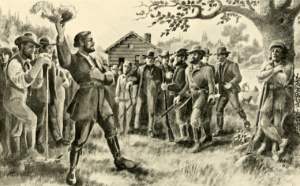 mountain men spent a lot of time considering the possibility of an attack, and practicing in their head exactly how they would handle it.
mountain men spent a lot of time considering the possibility of an attack, and practicing in their head exactly how they would handle it.
Meek soon established good relations with many Native Americans, effectively melding with the Indians. He even married three Native American women, including the daughter of a Nez Perce chief. Now, that didn’t mean that he didn’t fight with the tribes on occasion, or at least the tribes who were hostile to the incursion of the mountain men into their territories. Meek intended to fight for his right to be on the land, the same as the Indians. In the spring of 1837, Meek was nearly killed by a Blackfeet warrior who was taking aim with his bow while Meek tried to reload his Hawken rifle. In the end, the warrior nervously dropped his first arrow while drawing the bow, and Meek had time to reload and shoot. The warrior’s fumble cost him his life, while saving Meek’s life.
After a great run as a mountain man, Meek recognized that the golden era of the free trappers was coming to a close. He began making plans to find another form of income. He joined with another mountain man, and along with his third wife, he guided one of the first wagon trains to cross the Rockies on the Oregon Trail. Once he arrived in Oregon, Meek fell in love with the lush Willamette Valley of western Oregon. He settled down and became a farmer, and actively encouraged other Americans to join him. Of course, more White men on what had been Indian lands, came with safety issued. Meek led a delegation to Washington DC to ask for military protection from Native American attacks and territorial status for Oregon in 1847. Though he arrived “ragged, 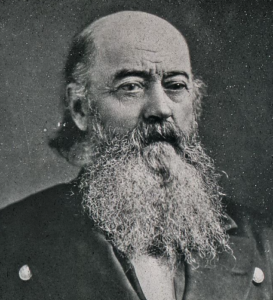 dirty, and lousy,” Meek became a bit of a celebrity in the capitol. Not used to the ways of mountain men, the Easterners truly enjoyed the rowdy good humor Meek showed in proclaiming himself the “envoy extraordinary and minister plenipotentiary from the Republic of Oregon to the Court of the United States.” His enthusiasm prompted Congress to making Oregon an official American territory and Meek a US marshal. I wonder if he was shocked by his new role.
dirty, and lousy,” Meek became a bit of a celebrity in the capitol. Not used to the ways of mountain men, the Easterners truly enjoyed the rowdy good humor Meek showed in proclaiming himself the “envoy extraordinary and minister plenipotentiary from the Republic of Oregon to the Court of the United States.” His enthusiasm prompted Congress to making Oregon an official American territory and Meek a US marshal. I wonder if he was shocked by his new role.
He might have been shocked, but Meek embraced his new role. He returned to Oregon and became heavily involved in politics, eventually founded the Oregon Republican Party. After his years of service, he retired to his farm, and on June 20, 1875, at the age of 65, Meek passed away. With his passing the world lost a skilled practitioner of the frontier art of the tall tale. It is said that his life was nearly as adventurous as his stories claimed, but there is no sure line to tell what was real and what was tall tale.
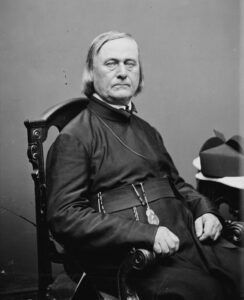 As the United States was being settled, a number of wars were fought between the Native Americans and the White Man. So much anger and so many hard feelings had passed between the two groups that it seemed like peace could never be achieved. Finally, in an attempt to convince local Native Americans to make peace with the United States, the Jesuit missionary Pierre-Jean De Smet met with the Sioux leader Sitting Bull in what is present-day Montana. He saw an urgent need to make peace and decided to go for it.
As the United States was being settled, a number of wars were fought between the Native Americans and the White Man. So much anger and so many hard feelings had passed between the two groups that it seemed like peace could never be achieved. Finally, in an attempt to convince local Native Americans to make peace with the United States, the Jesuit missionary Pierre-Jean De Smet met with the Sioux leader Sitting Bull in what is present-day Montana. He saw an urgent need to make peace and decided to go for it.
De Smet was a native of Belgium, who came to the United States in 1821 at the age of 20. Once in the states, he became a novice of the Jesuit order in Maryland. De Smet was ordained in Saint Louis, and as a priest, decided to be a missionary to the Native Americans of the Far West. It was an ambitious goal, but in 1838, he was sent to evangelize the Potawatomi villages near present-day Council Bluffs, Iowa. De Smet met a delegation of Flathead Indians there. The Indians had come east looking for a “black robe” whom they hoped might be able to aid their tribe. Of course, a “black robe” would be a priest, and since De Smet was indeed a priest, they had found what they were looking for. De Smet worked with the Flathead Indians several times during the 1840s in present-day western Montana. While there, he established a mission and actually secured a peace treaty with the Blackfeet, who had previously been the irreconcilable enemy of the Flathead.
His hard work earned De Smet a reputation as a white man who could be trusted to negotiate disputes between Native Americans and the US government, which was not something that very many people could boast. The disputes between the Indians and the US government became fairly commonplace in the West during the 1860s. The Plains Indians, like the Sioux and Cheyenne resisted the growing flood of white settlers invading their territories and killing their game animals. As the conflicts continued, the US government began to demand 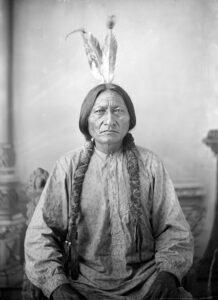 that all the Plains Indians be relocated to reservations, another source of contention. The leaders in the American government and military had hoped that the relocation could be achieved through negotiations, but in the absence of a peaceful relocation, they were perfectly willing to use violence to force the local Native Americans to comply. It was futile to fight the change, but anyone can see why the Native Americans would try. They didn’t want to be forced to stay in just one area and to be told what they could and could not do…and in reality, the reservations have not proven to be the best thing for either side. Nevertheless, that is where we are today, and in many ways, the situation hasn’t improved much, except there aren’t Indian wars, so I guess that is a good thing. The disputes are handled differently now, but the feeling of a nation inside a nation is one that really isn’t perfect. Still, the Indian Nation does exist inside the United States, and they do have jurisdiction in their own territory, and I don’t suppose the feeling of separation will ever change.
that all the Plains Indians be relocated to reservations, another source of contention. The leaders in the American government and military had hoped that the relocation could be achieved through negotiations, but in the absence of a peaceful relocation, they were perfectly willing to use violence to force the local Native Americans to comply. It was futile to fight the change, but anyone can see why the Native Americans would try. They didn’t want to be forced to stay in just one area and to be told what they could and could not do…and in reality, the reservations have not proven to be the best thing for either side. Nevertheless, that is where we are today, and in many ways, the situation hasn’t improved much, except there aren’t Indian wars, so I guess that is a good thing. The disputes are handled differently now, but the feeling of a nation inside a nation is one that really isn’t perfect. Still, the Indian Nation does exist inside the United States, and they do have jurisdiction in their own territory, and I don’t suppose the feeling of separation will ever change.
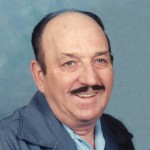
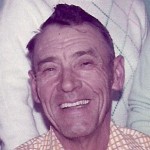 I always greet Father’s Day with mixed emotions. I don’t have my dad, Allen Spencer or my father-in-law, Walt Schulenberg with me anymore, so there is always a little bit of sadness too, because I miss them both so much. They were both so important to me…they still are, but now they are in Heaven, and in my future. Nevertheless, on this and every day, I think of them lovingly, because they were so influential in my life. God blessed me, my husband, and siblings with two of the greatest dads ever. Both were gentle souls, soft spoken and kind, and both were hard workers. Sometimes, the similarities surprised me, but I always knew that I was loved and valued.
I always greet Father’s Day with mixed emotions. I don’t have my dad, Allen Spencer or my father-in-law, Walt Schulenberg with me anymore, so there is always a little bit of sadness too, because I miss them both so much. They were both so important to me…they still are, but now they are in Heaven, and in my future. Nevertheless, on this and every day, I think of them lovingly, because they were so influential in my life. God blessed me, my husband, and siblings with two of the greatest dads ever. Both were gentle souls, soft spoken and kind, and both were hard workers. Sometimes, the similarities surprised me, but I always knew that I was loved and valued.
When I met and married my husband, Bob Schulenberg, God gave me a perfect soulmate. Bob took after his dad is so many ways, not the least of which, was his work ethic. They had spent countless hours together working on cars and other projects around his dad and mom’s place. They probably spent just as much time 

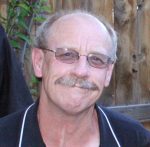 working on our stuff too. Bob was a “girl-dad” and a very good one. Our girls had him wrapped around their little pinky, and he was just fine with that. He was like his dad in so many ways, and that soft heartedness followed him into fatherhood. The girls could have gotten away with just about anything, because like his dad, Bob was a softie.
working on our stuff too. Bob was a “girl-dad” and a very good one. Our girls had him wrapped around their little pinky, and he was just fine with that. He was like his dad in so many ways, and that soft heartedness followed him into fatherhood. The girls could have gotten away with just about anything, because like his dad, Bob was a softie.
Now our girls are both married to wonderful men, Kevin Petersen and Travis Royce, and we consider ourselves very blessed to have both of these wonderful sons-in-law in our lives too. It is so great to be able to give your daughter in marriage, knowing that the man she is marrying is going to treat her well, provide for her, and take care of her. The years have brought many changes into our girls’ lives, and their husbands have been beside 
 them all the way. they have given us a beautiful granddaughter, and three handsome grandsons, who have all blessed our lives greatly. And now, two of our grandsons are dads too. Chris (Karen) Petersen and Josh (Athena Salazar, soon to be Petersen) Petersen. The next generation of babies have brought us a great granddaughter, Cambree Petersen, two grandsons, Caysen Petersen and Justin Petersen, and two more grandsons on the way. Life is good!! Happy Fathers’ Day to all of the dads in my life, and to all of the other dads out there. Have a wonderful day and know that you are loved and appreciated very much!!
them all the way. they have given us a beautiful granddaughter, and three handsome grandsons, who have all blessed our lives greatly. And now, two of our grandsons are dads too. Chris (Karen) Petersen and Josh (Athena Salazar, soon to be Petersen) Petersen. The next generation of babies have brought us a great granddaughter, Cambree Petersen, two grandsons, Caysen Petersen and Justin Petersen, and two more grandsons on the way. Life is good!! Happy Fathers’ Day to all of the dads in my life, and to all of the other dads out there. Have a wonderful day and know that you are loved and appreciated very much!!
 While flight remains one of the safest forms of travel, there is always the possibility of a malfunction that can have devastating effects. In the case of United Airlines Flight 624, a Douglas DC-6 airliner, registration NC37506, was a scheduled passenger flight from San Diego, California to New York City. Very likely, these passengers had taken this exact same flight a number of times, and possibly on this exact same plane. Nevertheless, this flight was about to be very different…and that difference was going to have devastating effects on the plane and on the outcome of this flight.
While flight remains one of the safest forms of travel, there is always the possibility of a malfunction that can have devastating effects. In the case of United Airlines Flight 624, a Douglas DC-6 airliner, registration NC37506, was a scheduled passenger flight from San Diego, California to New York City. Very likely, these passengers had taken this exact same flight a number of times, and possibly on this exact same plane. Nevertheless, this flight was about to be very different…and that difference was going to have devastating effects on the plane and on the outcome of this flight.
Flight 624 took off from Lindbergh Field, in what appeared to be a normal flight. The flight made its first scheduled stop at Los Angeles Airport, followed by a normal scheduled stop at Chicago Municipal Airport. Everything was normal for both stops. In fact, the 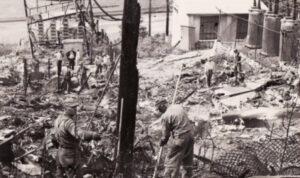 whole flight proceeded normally until they began their descent into New York’s LaGuardia Airport. They began their descent over Pennsylvania, and suddenly, they had a warning alarm telling them of a fire in the cargo hold. The crew responded to what was later determined to be a false signal of a fire in the front cargo hold by releasing CO2. Proper operating procedure called for opening the cabin pressure relief valves prior to discharging the CO2 bottles, to allow for venting of the CO2 gas buildup in the cabin and cockpit. There was no evidence found of the crew opening the relief valves. Either they forgot or it malfunctioned (which didn’t appear to be the case). As a result, the released CO2 gas seeped back into the cockpit from the front cargo hold and apparently
whole flight proceeded normally until they began their descent into New York’s LaGuardia Airport. They began their descent over Pennsylvania, and suddenly, they had a warning alarm telling them of a fire in the cargo hold. The crew responded to what was later determined to be a false signal of a fire in the front cargo hold by releasing CO2. Proper operating procedure called for opening the cabin pressure relief valves prior to discharging the CO2 bottles, to allow for venting of the CO2 gas buildup in the cabin and cockpit. There was no evidence found of the crew opening the relief valves. Either they forgot or it malfunctioned (which didn’t appear to be the case). As a result, the released CO2 gas seeped back into the cockpit from the front cargo hold and apparently 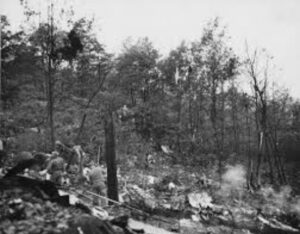 partially incapacitated the flight crew. It would be like being in a closed-up garage and leaving your car running. The decision-making process of the crew became compromised. As things got worse, the crew put the aircraft into an emergency descent, miscalculating their altitude, and as the plane descended lower than it should have, it hit a high-voltage power line and burst into flames. The plane then smashed through the trees of a wooded hillside about five miles from Mount Carmel, Pennsylvania, a small town 135 miles from Philadelphia, at 1:41pm EDT on June 17, 1948. When the four-engined, propeller-driven airplane crashed, it resulted in the deaths of all four crew members and 39 passengers on board.
partially incapacitated the flight crew. It would be like being in a closed-up garage and leaving your car running. The decision-making process of the crew became compromised. As things got worse, the crew put the aircraft into an emergency descent, miscalculating their altitude, and as the plane descended lower than it should have, it hit a high-voltage power line and burst into flames. The plane then smashed through the trees of a wooded hillside about five miles from Mount Carmel, Pennsylvania, a small town 135 miles from Philadelphia, at 1:41pm EDT on June 17, 1948. When the four-engined, propeller-driven airplane crashed, it resulted in the deaths of all four crew members and 39 passengers on board.
 During World War II, and through the Vietnam War, the United States government was facing a situation with the US dollar that was different from prior years. It’s not something we really think about much, but it had to do with the fact that the countries the US Military was in were unsure of how their money was going to play out if they were one of the countries that fell. The dollar was stable, so they were happy to take payment in the US dollar over their own currency. In fact, the local civilians often accepted payment in dollars for less than the accepted conversion rates, meaning that they lost money in the deal. Dollars became more favorable to hold, which further inflated the local currencies, defeating plans to stabilize local economies. On top of that, troops were being paid in dollars, which they could
During World War II, and through the Vietnam War, the United States government was facing a situation with the US dollar that was different from prior years. It’s not something we really think about much, but it had to do with the fact that the countries the US Military was in were unsure of how their money was going to play out if they were one of the countries that fell. The dollar was stable, so they were happy to take payment in the US dollar over their own currency. In fact, the local civilians often accepted payment in dollars for less than the accepted conversion rates, meaning that they lost money in the deal. Dollars became more favorable to hold, which further inflated the local currencies, defeating plans to stabilize local economies. On top of that, troops were being paid in dollars, which they could  convert in unlimited amounts to the local currency with merchants at the floating (black market) conversion rate, which was much more than the government fixed conversion rate. It was rather a great money-making proposition, but really wasn’t ethical. This conversion rate imbalance allowed the servicemen to profit from the more favorable exchange rate.
convert in unlimited amounts to the local currency with merchants at the floating (black market) conversion rate, which was much more than the government fixed conversion rate. It was rather a great money-making proposition, but really wasn’t ethical. This conversion rate imbalance allowed the servicemen to profit from the more favorable exchange rate.
While anyone could understand how people would want to make money if they can, it was really going to be damaging to the local economy in the end. The MPCs were designed to stop the unfair conversion rate of currency. The scrip (MOCs) was changed out periodically, to avoid hoarding. Once they came out with a new version of scrip, the prior version became worthless. Another way they were supposed to eliminate the problem was that MPCs were only allowed to be used by military personnel in military facilities and approved locations. As a safeguard, if the MPCs  were converted to local currency, they were not allowed to be reconverted to MPCs, so the plan was useless. US MPCs were in use from 1946-1973 and were used in all overseas military locations.
were converted to local currency, they were not allowed to be reconverted to MPCs, so the plan was useless. US MPCs were in use from 1946-1973 and were used in all overseas military locations.
I was actually watching an episode of MASH this morning about this very thing. The men were buying up the old scrip from people who couldn’t get to the exchange. Of course, they bought it for less than its value, planning to cash in when they turned it in for its face value. The solution for that problem was that the military personnel were restricted to the base on C-Days…currency exchange days. I don’t know how much of the fraudulent exchanges were stopped in this way, but it might have stopped some.

 My little grandnephew, Jace Swan has been having an exciting year this year. After being an only child for all of his life, he finally got a baby brother eleven months ago, and he couldn’t be happier. Jace is such a big help to his parents, Sierah Martin and Riley Birky. And he life’s his brother, Ryder Birky to infinity and beyond. Jace has been helping to teach Ryder things, like walking, which Ryder has mastered, with the help of his brother and the motivation to follow his brother around, haha!!
My little grandnephew, Jace Swan has been having an exciting year this year. After being an only child for all of his life, he finally got a baby brother eleven months ago, and he couldn’t be happier. Jace is such a big help to his parents, Sierah Martin and Riley Birky. And he life’s his brother, Ryder Birky to infinity and beyond. Jace has been helping to teach Ryder things, like walking, which Ryder has mastered, with the help of his brother and the motivation to follow his brother around, haha!!
Jace graduated from pre-school a few days ago, and now he is 
 having his last summer as a pre-school kid, because Kindergarten is on the horizon for him. He is such a smart boy, and I know that her will be an amazing student. He’s so smart, and I know he will do great in Kindergarten…and beyond. And since he knows how to “teach” his brother things, I know he will be great at learning his school lessons too.
having his last summer as a pre-school kid, because Kindergarten is on the horizon for him. He is such a smart boy, and I know that her will be an amazing student. He’s so smart, and I know he will do great in Kindergarten…and beyond. And since he knows how to “teach” his brother things, I know he will be great at learning his school lessons too.
Jace is such a sweet boy. Everyone loves him and he loves people too. Jace loves playing outside and playing video 
 games…what kid doesn’t these days, but that doesn’t consume all of his time, because he just loves his little brother. Jace loves to swing with Ryder, make him laugh. They are just simply best buddies!! Much has changed for Jace, and he is totally enjoying all the new and exciting aspects of his life. Today is Jace’s 5th birthday Happy birthday Jace!! Have a great day!! We love you!!
games…what kid doesn’t these days, but that doesn’t consume all of his time, because he just loves his little brother. Jace loves to swing with Ryder, make him laugh. They are just simply best buddies!! Much has changed for Jace, and he is totally enjoying all the new and exciting aspects of his life. Today is Jace’s 5th birthday Happy birthday Jace!! Have a great day!! We love you!!

